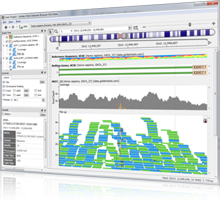It has now been about a year since Illumina and Affymetrix announced their respective exome genotyping arrays. Both products were launched with ambitious visions of how they would enable researchers to learn significantly more about the cause of human diseases. Sales of the Illumina chip exceeded expectations, and the company said that it sold enough exome chips through the first… Read more »
Golden Helix announced it would offer a complimentary genome browser for visualizing DNA and RNA-Seq data back in October of 2011; however no release date was disclosed at that time. Well, after much blood, sweat, and tears, we are VERY excited to announce that GenomeBrowseTM is here! GenomeBrowse raises the bar on the on the experience of exploring and finding… Read more »
Dr. Ken Kaufman’s extremely popular webinar inspired us to build new tools that would simplify the process of analyzing whole-exome DNA sequencing data even further. First I’ll describe the tools showcased in the webcast. Then I’ll detail the new tools we created to allow for a revised and simplified workflow. Subset Informative Genotypes by Category The Subset Informative Genotypes by… Read more »
As first announced in October 2011 and previewed in a blog post last month, Golden Helix has been hard at work for the last year developing a free genome browser called GenomeBrowseTM. We are now beyond excited to announce that GenomeBrowse will be available to the public on September 12th on our website. (Did we mention it’s free?) GenomeBrowse raises… Read more »
Dr. Peter K. Gregersen, head of the Robert S. Boas Center for Genomics and Human Genetics at the Feinstein Institute for Medical Research, utilizes GWAS, targeted arrays, and sequencing technologies to identify genes associated with human autoimmune disorders. The arrival of the GWAS platform in the mid-2000’s greatly accelerated the pace of gene discovery—as well as accelerating the number of… Read more »
What prevents scientists from being more productive and if we knew, could we do anything about it? I’d like to look at an often overlooked, but huge productivity inhibitor — bad multitasking. Many people put “excellent multitasker” on their resume as a badge of honor. We laud the efficiency of a good multitasker — they are rarely idle — someone… Read more »
After my latest blog post, Jeffrey Rosenfeld reached out to me. Jeff is a member of the Analysis Group of the 1000 Genomes Project and shared some fascinating insights that I got permission to share here: Hi Gabe, I saw your great blog post about the problems in the lack of overlap between Complete Genomics and 1000 Genomes data. I… Read more »
Thank you to everyone who joined us yesterday for a webcast by Dr. Ken Kaufman of Cincinnati Children’s Hospital: “Identification of Candidate Functional Polymorphism Using Trio Family Whole Exome DNA Data.” Over 750 people registered for this event and 430 attended – a new Golden Helix record! If you missed the webcast (or would like to watch it again), the… Read more »
I recently curated the latest population frequency catalog from the 1000 Genomes Project onto our annotation servers, and I had very high hopes for this track. First of all, I applaud 1000 Genomes for the amount of effort they have put in to providing the community with the largest set of high-quality whole genome controls available. My high hopes are… Read more »
Last month I was inspired to create a new way to keep our customers apprised of the latest information on Golden Helix software without cluttering inboxes and overwhelming our blog. I happened to receive a link to an article for one of Illumina’s bulletins and realized that was exactly what we needed at Golden Helix as well! On Wednesday, we… Read more »
There is nothing cooler than having something arrive that you have been excitedly waiting for: last week I got an email notification that my 23andMe exome results were ready. Actually, I got 3 emails that my exome results were ready. You see, I lucked out. It all began two years ago on DNA day when Hacker News reported that 23andMe… Read more »
SVS 7.6.7 features new tools for filtering sequencing data based on functional predictions and allele frequencies. To complement these new features, new annotations tracks have been uploaded to our data server and are now available for our customers! Below you will find descriptions of the new tools and the related annotations track(s).
Dr. John Curtin is a Lecturer in Functional Genomics at the University of Manchester where he works with a large team studying the development of asthma in a birth cohort. This group has received data on study subjects periodically for over a decade including before birth. Given how much data there is, data management is a big deal to Dr…. Read more »
Recently I gave a presentation on bioinformatic filtering: the process of using quality scores, annotation databases, and functional prediction scores to intelligently and quickly reduce your variant search space. View the recording here» In this webcast, I mention that filtering is something we have been doing for a long time, and that there are some great examples that use exome… Read more »
The script development team at Golden Helix has been hard at work these past few months and this means several new and exciting tools for our SVS customers! The scripts featured in this blog post vary in function, from expanding the analytical options currently offered in SVS to transforming and editing spreadsheets. As always, we invite you to visit our… Read more »
As Product Quality Manager, I have been spending quite a bit of time lately thinking about the best way to communicate with our Golden Helix customers with regards to product quality and customer support issues. Most of our customers at this point have already seen several emails from me this year! Email is certainly one way to get an announcement… Read more »
Reading through the last release of AJHG I saw a couple papers mention that the putative rare variant they were investigating was “not present in over 10,000 control chromosomes from the EVS”. My first reaction was, “What? Do they mean the NHLBI 5400 Exome Sequencing Project? They only have 5,400 exomes not over 10,000! I wonder if there is some… Read more »
Today I ran into an interesting fact about how a prolifically used catalog of population controls classifies African Americans with potential impacts on research outcomes. The 1000 Genomes Project is arguably our best common set of controls used in genomic studies. They recently finished what was termed as “Phase 1” of the project, and they have been releasing full sets… Read more »
Bioinformatics is a serious thing. Petabytes of data that hold the truth to the genetic underpinnings of the human species, among many others, are generated and analyzed by the world’s leading scientists every year. Here at Golden Helix, we thought that there was plenty of room to add a little humor into the bioinformatics world. Meet Dr. X. He is… Read more »
Type 2 Diabetes, Rheumatoid Arthritis, Obesity, Chrohn’s Diseases and Coronary Heart Disease are examples of common, chronic diseases that have a significant genetic component. It should be no surprise that these diseases have been the target of much genetic research. Yet over the past decade, the tools of our research efforts have failed to unravel the complete biological architecture of… Read more »





